How to Lose Weight Before Summer
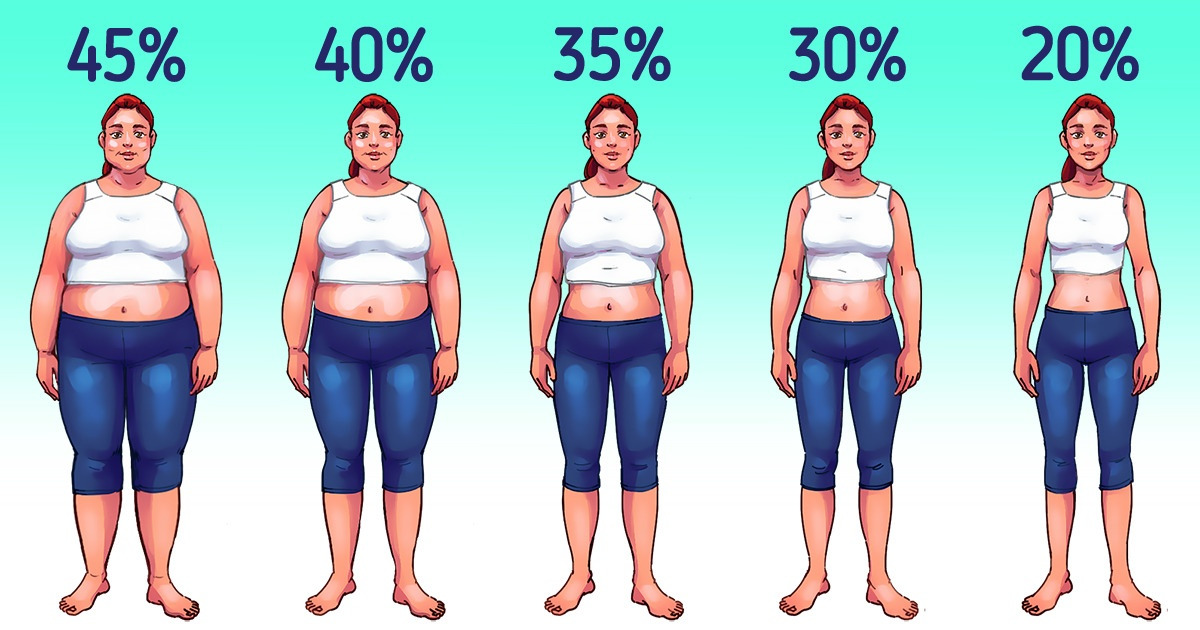
It’s springtime, and the beach season is just around the corner. Many of us likely want to get our bodies fit, but there are so many diets, programs, and life hacks out there that it’s hard to make the right choice.
5-Minute Crafts put together experts’ recommendations that can help you lose weight and meet the summer looking your best.
❗ This article is for information only. If you’re unhappy with your weight, consult your doctor.
The formula for healthy weight loss is a healthy diet, calorie control, and increased physical activity. If you want to lose weight and not gain it back, any changes in your lifestyle and health habits should become permanent.
Many people disagree about what is more important in losing weight, diet or exercise. Diet is more important for weight loss, while physical activity plays a smaller role. But if you want to maintain your results, you have to exercise.
At the beginning
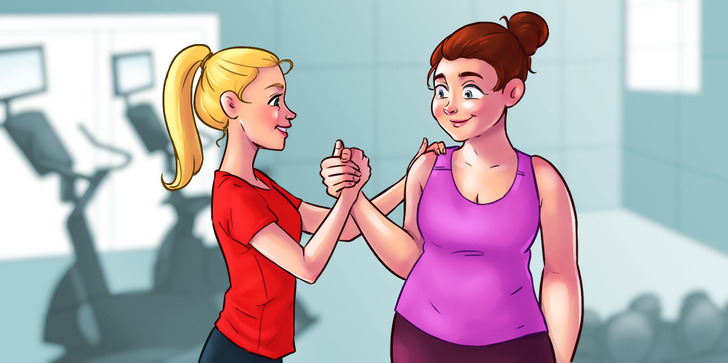
- Readiness: Make sure you are really ready to start losing weight. This is quite a long process that requires a lot of effort. Most likely, you will have to reconsider your diet and lifestyle, adding physical activity to it. If necessary, consult your doctor.
- Motivation: Find what really motivates you. The beginning of the summer season can serve as great motivation to start following a new healthy lifestyle. Motivational pictures placed around your house, especially in the kitchen, can sometimes help you not to leave the chosen path.
- Support: Pick people to support you if you need it. Losing weight together with someone else is more fun. But the main thing is that your loved ones support you, cheer you up when you need it, and praise you for your results.
- Goals: Set realistic weight loss goals. It’s important that you lose weight in a healthy way. Losing 45 pounds within a couple of months is not only almost impossible but also dangerous. Your first goal should be losing 5% of your weight. For example, if your weight is 180 pounds, you need to lose 9 pounds.
- Diet: Before you start losing weight, you’ll likely review your diet and reduce your calorie intake. But this doesn’t mean that your food will be tasteless or that you’ll have to eat the same thing over and over again. Make interesting, low-calorie dishes and enjoy every meal.
- Activity: Incorporate physical activity into your life and enjoy it. Remember that any movement helps to burn calories. For example, you can refuse to use the elevator and start using only the stairs.
Habits that will help you lose weight

- Have breakfast. If you think you can cut calories by skipping breakfast, we’re about to disappoint you: you can’t. People who skip breakfast eat more during the day than those who eat it in the morning.
- Close the kitchen for the night. Determine a time after which you will not eat. This will help you avoid late-night snacks and the mindless eating of junk food in front of the TV. Brush your teeth right after dinner so you’re less likely to eat something before bed.
- Eat often. Experts recommend eating in small portions but every 3-4 hours. This will help keep your blood sugar levels stable and prevent you from overeating.
- Control yourself. Buy healthy foods for home consumption and choose cafes and restaurants that serve healthy foods. If you’re going to a party, eat something healthy at home beforehand. This will help you eat less “unhealthy food” at the party.
- Drink water. You need to drink enough water for your metabolism to work as efficiently as possible, and your digestive system to function normally.
- Go for lighter alternatives. Opt for light mayonnaise over regular mayonnaise, dark chocolate over milk chocolate, and whole-grain bread over white bread. The cream in your favorite coffee can be replaced with low-fat milk.
- Eat more fruits and vegetables. If you eat a lot of low-calorie fruits and vegetables, you will eat fewer foods that are high in calories and fat.
- Reduce your portions. You can lose weight by simply reducing your usual portions by only 10%-20%. And replace big dishes with smaller ones so that your portions don’t look too small on a big plate.
- Get enough sleep. Try to go to bed early so that your body has enough time to fully rest at night. Sleep deprivation can negatively affect weight loss by causing sugar cravings and reducing the desire to exercise.
- Don’t eat if you’re not hungry. Sit down at the table only when you are really hungry. Try not to neglect your breakfast, but if you don’t feel hungry at all, you shouldn’t force yourself.
Important things about your diet
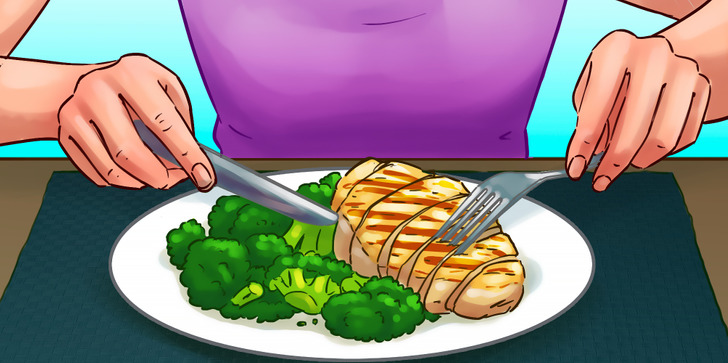
- Cut down on carbs. Try to stick to a low-carb diet: this will allow you to consume fewer calories without feeling constantly hungry. In addition, experts say that a low-carb diet contributes to weight loss and improves health in general.
- Eat protein. Add protein to every meal, opting for low-fat proteins. This will keep you full for longer and reduce the chance of overeating.
- Don’t let marketing tricks fool you. By trying to eat fewer carbs, you might choose foods that promise to be low in carbohydrates. However, this may just be a marketing trick. Don’t buy low-carb bread or cookies, as they will still be high in carbs.
- Choose high-quality, minimally processed natural food. Try to buy foods with a short list of ingredients, if any at all.
- Be careful with fruit. Fruit is very healthy, as it contains fiber, antioxidants, and vitamins. However, it also contains sugar. Therefore, fruit, like any other food, should be consumed in moderation.
- Avoid non-caloric sweeteners. While on a diet, many people try to replace sugar with non-caloric sweeteners. However, studies have shown that they can increase appetite and maintain cravings for sweet food.
The role of calories
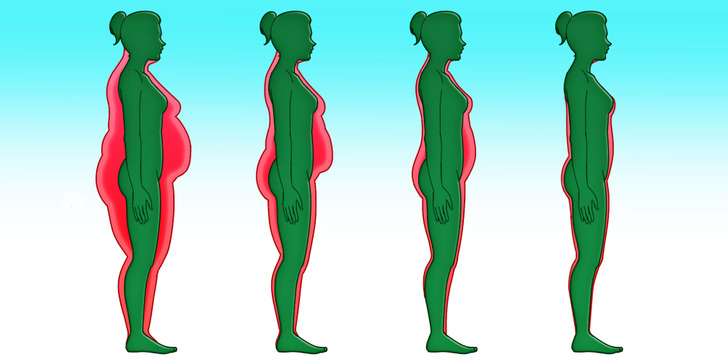
Calories play the most important role in weight loss. To lose weight, you should consume fewer calories than your body burns.
Calories are the energy we get from food. They are responsible for the functioning of our bodies. Calories give us the strength to get up from a chair or run a marathon. All unspent energy that comes to us with food is deposited in the form of fat.
The weight loss formula is simple: burn more than you consume. For example, if you want to lose 1 pound per week, you need to consume 500 to 1,000 calories daily.
How to cut calories:
- Avoid high-calorie foods.
- Replace high-calorie foods with lower-calorie alternatives.
- Reduce your portions.
Currently, there are many online calorie calculators that can help you count the number of calories consumed.
Percentage of body fat
Before you start losing weight, it’s recommended to find out your body fat percentage and track its changes in the future. Thus, you will be able to understand whether you lose fat or muscle. If you lose muscle mass, you can adjust your diet and workout program and achieve maximum fat loss with minimal muscle loss.
The body fat percentage in women is higher than in men. 28%-33% of body fat is considered normal for women ages 20 to 39 years. Higher numbers may indicate that you have more body fat than you need. Body fat below 28% is typical for women with an athletic build. However, a body fat percentage below 20% indicates a lack of fat tissue.
With age, the percentage of fat can increase, and this is normal. For example, the upper limit of the normal level is 34% for women who are 40 to 59 years old, and 36% for women older than 60 years old.
Be more active.
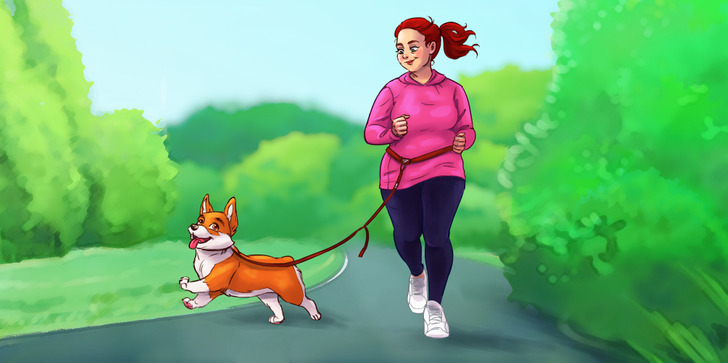
In order to lose weight, a person should burn more calories than they consume. Physical activity is important for weight loss and maintenance.
- Walking: Try to gradually increase the number of steps you walk a day, aiming for 10,000 steps a day. Try to move more during the day: walk while talking on the phone, walk your dog more often, or march in place while watching TV.
- Aerobic activity: Experts recommend about 150 minutes of moderate aerobic activity or 75 minutes of intensive aerobic activity per week. Moderate aerobic exercise includes brisk walking, swimming, or lawn mowing. Intensive aerobic activity includes running and aerobic dancing. They can be combined.
- Strength training: If you want to maintain your weight, it’s recommended to do strength exercises at least 2 times a week. Strength training is done using weight machines or your own body weight.
Try to distribute your physical activity evenly throughout the week. Your daily activity should be at least 30 minutes long.
Important! All workouts must be supervised by a personal trainer. If you have health problems, consult your doctor first.
What to do if you can’t lose weight

- Get your hormones checked. If you can’t lose weight, pay attention to your health. The cause of excess weight may be a hormonal imbalance. Consult your doctor. You may want to check your thyroid hormones, sex hormones, and cortisol, the stress hormone.
- Get enough vitamins. Our body should get enough vitamins and minerals. If the food you eat is not nutritious enough, the body can react with feelings of hunger.
- Pay attention to medications. Certain medications can cause weight gain or slow down weight loss.